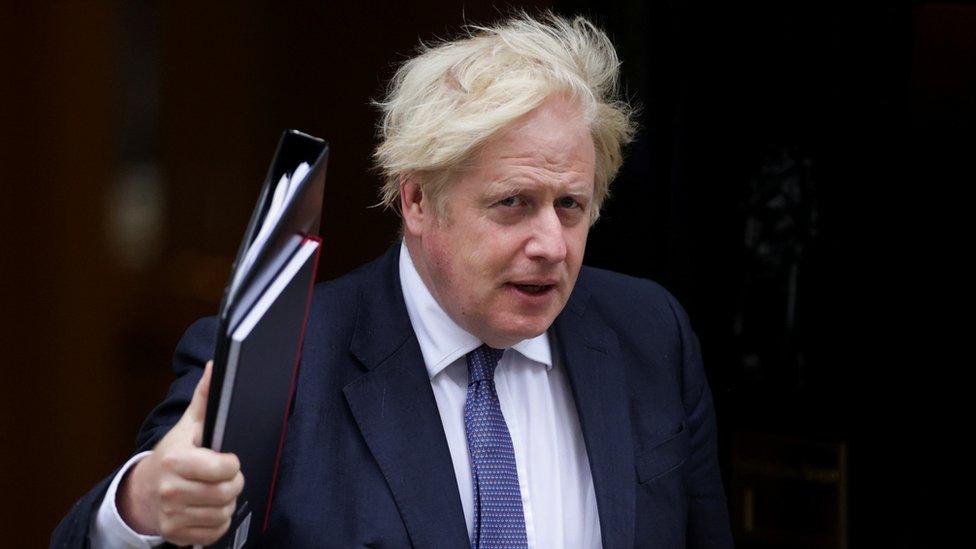Social care: Arguments ahead as PM sets out overhaul of sector
- Published

As Westminster has been cranking up for a busy autumn, so too has frantic and fraught speculation about the government's first big move of the political season.
At around noon on Tuesday, Boris Johnson will unveil his plan to "fix" the system in England that looks after some of the most vulnerable people in society.
It will come more than two years, an election, and a pandemic after he first promised to do so.
Despite thousands of column inches and hours and hours of earnest public debate already, there is a huge amount that we don't know about what will be on offer.
And as I write on Monday evening, most of the cabinet is not fully in the loop. Let's start though with what we do expect.
The government is expected to announce an increase in National Insurance, the tax paid by workers and employers, likely of 1.25%, to raise billions of pounds to pay for helping the NHS catch up with lost time and treatment after the pandemic, and to help improve and pay for social care in England.
I'm told the cash raised, potentially over £12 billion, will be ring-fenced somehow, targeted initially at the health service itself then will switch to social care after three years.
Expect also promises of changes to how the system works, including limiting the amount that families have to pay for care if need it.
Dilnot plans return
As I wrote before the summer, for months it's been likely that the plan would be based on reforms put forward by Sir Andrew Dilnot years ago, not least because the legislation required is also on the statute book.
The social care changes do relate to the system in England, because Scotland, Wales and Northern Ireland all have different mechanisms when it comes to its provision.
But if extra National Insurance income is spent in the way we'd expect, there will be more money for every part of the UK too.
It's likely there would have to be a specific vote in Parliament to set the level of the limit, or "cap" for families in England.
But the Dilnot framework already exists, which reduces the need for months of wrangling or Commons complications.
Indeed, whispers today suggest that ministers might push for a vote sooner rather than later on the increase to NI, potentially branded as the "Health and Social Care Levy".
And by tying the long-term changes to the care system to extra cash the NHS says it needs because of the pandemic, it could make it harder for critics to oppose the plan.

The care system is facing growing demands as a result of an ageing UK population
I'm told the proposals include increasing current hospital capacity to 110% of its current level, to help make up for lost time and treatments during the pandemic.
It's potentially one thing for an angry MP to argue against a costly and complicated change to the social care system. It's quite another to vote against extra money for the health service.
We also know that Boris Johnson is willing to break a manifesto pledge by raising National Insurance, and up for going ahead with a tax rise that proportionately hits the young and less wealthy harder than the richer and older generation.
One minister suggested that unfairness would be balanced out with the chancellor's expected ditching of the so-called triple lock that protects the level of pension payments.
That might help government ministers with their script, but it doesn't smooth the edges of what many see as a blunt increase to a tax paid by millions.
And it is abundantly clear that many Conservatives, including Cabinet ministers, are very unhappy with the proposed tax increase.
That's not just because it breaks the promise in their 2019 election manifesto, once seen as politically sacred documents, not to raise NI.
But also because the details of the reforms that are meant to take place alongside it are sketchy.
Questions remain
Which takes us to what we don't know - a lot.
First, we don't know what kind of changes will be made to the care sector yet.
What about the workforce? What about local authorities' role? What will the limits be on what families have to pay for care?
And what about so called "hotel" costs, for food and accommodation in residential care?
Crucially, what kind of guarantee will there be that the huge amount of extra cash raised will actually go to the NHS and then on to social care, when it's a rise in general taxation?
What will happen to the money due to social care in three years' time if the NHS comes to believe that it actually needs to keep the extra finances?
How much extra will the NHS itself, and social care providers, have to stump up in extra NI themselves? As a huge employer, the NHS could find itself on the hook for hundreds of millions of pounds.
When the details of the plan - named "A Build Back Better Plan for the NHS and Social Care," I'm told (what else, I hear you cry) - emerge in black and white at lunchtime on Tuesday, it's likely more questions will emerge in response.
There will be noise. There are arguments ahead. The opposition parties are bristling.
The prime minister may receive only ragged support from his party for the plan.
But Boris Johnson has had enough of answering "wait and see" when asked for his plan on social care, and is unwilling to go into the next election with this long-running dilemma not resolved.
Related topics
- Published6 November 2022

